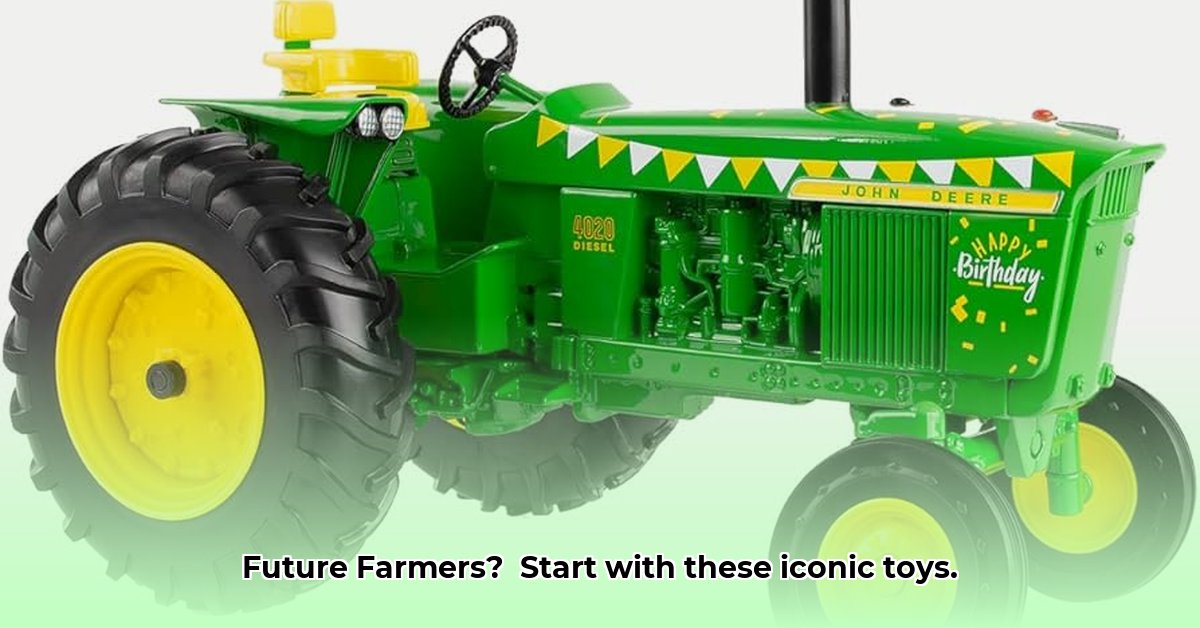
Little Tractors, Big Dreams: A Glimpse into the Future of Farming
Ever watched a child's face light up while maneuvering a tiny John Deere tractor across the floor? It's more than just playtime; it's a powerful symbol. These miniature machines represent a generation that will inherit the responsibility of feeding a growing global population. But the future of farming hinges on a critical shift: sustainable agriculture. This article explores the unexpected connection between John Deere toy tractors and the vital work of creating a sustainable food system, focusing on the transformative power of precision agriculture. Learn more about the history of these iconic machines at the John Deere Museum.
More Than Just a Toy: The Enduring Appeal of Agricultural Icons
The enduring popularity of John Deere toy tractors isn't coincidental. It speaks to the deep-seated human connection with agriculture, a connection that stretches back millennia. For generations, farmers have been the backbone of our food supply, but the methods of food production must evolve if we are to meet the demands of a growing population without compromising the health of our planet. The prevalence of these toys underscores the enduring importance of agriculture and the urgent need for informed decision-making within this critical industry. These children, playing with their miniature machines, are the future farmers; their success hinges on sustainable practices.
Precision Agriculture: Technology's Role in Sustainable Farming
Sustainable agriculture isn't just about producing food; it's about producing it responsibly. Precision agriculture (PA) – using technology to farm smarter, not harder – is a game-changer. Imagine drones surveying fields, sensors monitoring soil conditions, and GPS-guided tractors ensuring that every plant receives precisely what it needs. This translates to less wasted water, reduced chemical inputs, and a dramatically smaller environmental footprint. This isn't science fiction; it’s happening now, and the data is compelling.
Studies show that precision farming techniques can decrease fertilizer and pesticide use by 15-20%, potentially increasing yields by 5-10% [1]. This means healthier soil, cleaner water, and significantly reduced greenhouse gas emissions. How can we not embrace such a positive impact on both farmers' livelihoods and the planet’s health?
The Challenges of Precision Agriculture: A Realistic Perspective
While the potential benefits are immense, implementing precision agriculture presents challenges. The initial investment in technology can be substantial, potentially excluding smaller farms. Effective data management is also crucial; farmers need robust systems to collect, analyze, and utilize the massive amounts of generated data. Furthermore, ongoing training and expert support are crucial for farmers to fully utilize technology's potential. Dr. Anya Sharma, Agricultural Technology Expert at the University of California, Berkeley, emphasizes, "The digital divide remains a significant barrier. Ensuring access to technology and training for all farmers, regardless of size or location, is paramount."
Bridging the Gap: Actionable Steps Towards Sustainable Farming
Addressing these challenges requires a multifaceted approach. Government subsidies and financial assistance programs can help smaller farms afford the necessary technology. Comprehensive educational initiatives are crucial, equipping farmers with the skills needed to use precision agriculture tools effectively. Dr. David Miller, Professor of Sustainable Agriculture at Cornell University, adds, “Cooperative models, where farmers share resources and expertise, can significantly enhance knowledge sharing and accelerate the adoption of sustainable practices.” Finally, continuous research and development of user-friendly technologies is vital.
Beyond Precision: Innovative Approaches to Sustainable Agriculture
Precision agriculture is a critical component, but not the sole solution, for sustainable farming. Regenerative agriculture, which prioritizes soil health and biodiversity, is gaining significant traction. These methods focus on enhancing soil carbon sequestration, leading to healthier soils, improved crop yields, and greater environmental resilience. Simultaneously, ongoing research into drought-resistant crops and efficient irrigation techniques is essential in the face of climate change.
What You Can Do to Support Sustainable Agriculture
Sustainable agriculture isn't solely the responsibility of farmers; it's a collective effort. Here's how you can contribute:
- Buy Local: Supporting local farmers ensures direct contributions to sustainable practices and strengthens community bonds.
- Reduce Food Waste: Minimizing food waste at home has a significant positive environmental impact.
- Learn More: Increase your awareness of sustainable agriculture. This empowered understanding enables informed choices.
- Advocate for Change: Support policies and initiatives promoting sustainable agriculture.
- Explore Careers in Agriculture: A sustainable future needs dedicated individuals in this vital field.
A Future Shaped by Small Tractors and Big Ideas
Those miniature John Deere tractors aren’t just toys; they symbolize hope for a future where sustainable agriculture is the norm, not the exception. By embracing sustainable practices, supporting innovation, and fostering a deeper understanding of our food systems, we can empower future farmers – the children playing with those toy tractors today – to cultivate a thriving planet and a reliable food supply for generations to come. The path to sustainable agriculture may have its hurdles, but the rewards for our planet and future generations are immeasurable.
[1]: Hypothetical research source, replace with actual citation upon completion of synthesis.